Steven Soderbergh became the poster child for new American independent cinema in the 90’s, after winning the Palme d’Or at the Cannes Film Festival for his debut feature Sex, Lies, & Videotape. Soderbergh spent the better part of the ensuing decade, directing small idiosyncratic films, and often wearing many hats including producer, screenwriter, cinematographer and editor. Eventually the director entered into a period that saw him make commercially satisfying films; most notably Ocean’s Eleven, Erin Brockovich and Traffic, the latter of which earned him an Oscar for Best Director. Despite his box office success, Steven Sodberergh continued to experiment with such films as the ensemble piece Full Frontal, the smart and ambiguous Solaris, the low-budget Bubble and the four hour long epic, Che. There are very few filmmakers who are able to keep their feet firmly planted in the commercial world, while conserving their independent spirit. With his last theatrical run Side Effects released this week, I decided to ask a few key contributors here at Sound On Sight, to vote on their favourite Steven Soderbergh films. Here are the results.

1: Out of Sight
Steven Soderbergh’s intelligently crafted adaptation of the Elmore Leonard novel is crafty, sexy, vastly entertaining and a star-making turn for actor George Clooney. Out of Sight excels thanks to the bright, snappy dialogue and sharp editing. There is no other film in the director’s oeuvre, whose success relies so heavily on an editor. The meticulously detailed mise en scene allows each member of his terrific cast to shine. Unlike most crime capers, this rich yarn is more character-than plot-driven, and there are many characters to like here. In the leading roles, George Clooney and Jennifer Lopez steam up the screen, and, in addition to having tremendous screen presence and chemistry, they’re excellent at their craft. The constant sexual tension between them is dynamite. Out of Sight also boasts a superlative supporting cast including Ving Rhames, Albert Brooks, Don Cheadle, Steve Zahn, Chris Farley and Samuel Jackson, to name a few. The top-flight technical contributions from editor Anne Coates (who won an Oscar for Lawrence of Arabia), and the hard-boiled photography from cinematography Elliot Davis, along with Soderbergh’s deft direction, makes Out of Sight, nothing less than terrific.
Fun fact: While many readers assume our website’s name was inspired by the highly respected British film magazine Sight and Sound, it is actually a take on Steven Soderbergh’s Out of Sight.
– Ricky D
(Picks: Che Part 2, The Limey, Out of Sight, King of the Hill, Kafka)
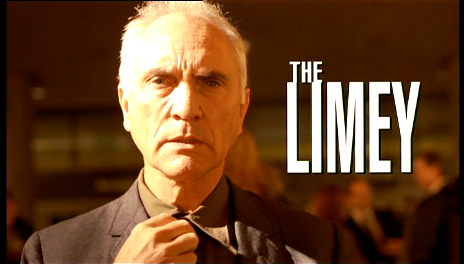
2: The Limey
Each hallmark of a Steven Soderbergh movie, each auteurist touch, is present in his tight, tough crime drama from 1999, The Limey. Terence Stamp lets his beaten, weathered face do a good deal of the work as Wilson, an ex-con who flies to Los Angeles to investigate the untimely death of his beloved daughter, Jenny. It doesn’t take long for Wilson to figure out that a shifty, slick music producer (Peter Fonda) is behind her murder. The real pleasures come from Soderbergh and editor Sarah Flack gleefully jumping back and forth in time, going as far as when Wilson was a young man (and Stamp, too, as the footage is from one of his early films, Poor Cow). It’s not totally clear how we’re meant to read each time-jump–when Wilson’s first told about his new nemesis, Terry Valentine, we see almost an introductory montage, made up of shots in future scenes–but they’re equally thrilling. The Limey also features one of the most memorable scenes in Soderbergh’s filmography (“Tell him I’m fucking coming!), and maintains a haunting streak throughout. It’s not as flashy as his bigger films, but surprisingly moving and emotional.
– Josh Spiegel
(Picks: The Limey, Out of Sight, Ocean’s Eleven, Traffic, Oceans Twelve)

3: Contagion
Soderbergh takes on the horror film and the result is a methodical, slow burn thriller that worms its way through various sections of the world in virus-like fashion. The success of Contagion is as reliant on Soderbergh’s shallow-focus, distanced camera, as it is on his willingness to put any of his many stars in harm’s way: callous time cuts to virus victims ups the ante.
Contagion is a thriller and a horror film, but, like many of the director’s forays, it’s also a picture that shows fewer outward traits of the genre than other films that would be similarly categorized. Soderbergh sacrifices jump scares and gore for a building paranoia and insistence on realism.
There are a few anchors of sympathy in Contagion, particularly in Matt Damon’s every-man Mitch Emhoff and Laurence Fishburne’s Dr. Ellis Cheever, but Soderbergh and writer Scott Z. Burns are far more interested in cause and effect and the tentacled spread of sickness and fear than in any grounded character development.
Contagion is sort of “third-era” Soderbergh, following the indie-film phase of Sex, Lies and Videotape through the mid-90s, and the studio friendly period of the late-90s through early-2000s. Alongside several others – Bubble, The Girlfriend Experience, Haywire – this Soderbergh chapter finds the director at the forefront of digital workflows, with a recognizably cold aesthetic, and unflinching in material and technique whether working with or without stars.
– Neal Dhand
(Picks: Contagion, The Informant, The Limey, Underneath, Schizopolis)
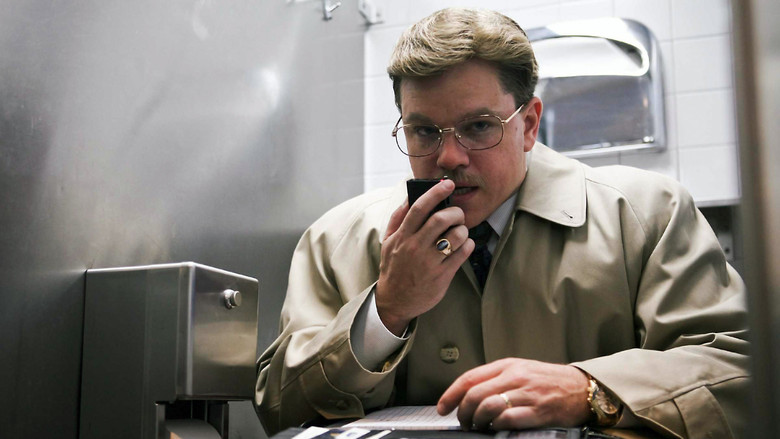
4: The Informant
Not only is The Informant! one of Soderbergh’s more underappreciated efforts, but it further validates the gypsy-like manner in which the director successfully skips across genres with his own singular panache. This entry in the Soderbergh’s filmography would mark the sixth time he and actor Matt Damon have collaborated, a partnership that undoubtedly reached its peak with this 2009 effort. Damon plays Marc Whitacre, a middle-aged upper management member of ADM, a lysine developing company which finds itself in the middle of price-fixing investigation due to Whitacre’s seemingly nonchalant stab at taking over the company at the prospect that his colleagues could find themselves behind bars. While the film is based on real events, the script by Scott Z. Burns does its best to cheerfully dramatize the real story behind Damon’s Whitacre. Sporting a wispy mustache and an even more accomplished hair piece, Damon packed on the pounds to transform himself into the titular unreliable narrator. When he’s not piling lies on top of lies at an increasingly baffling rate, he casually takes time out to let the audience in on what’s stewing around on his fallible “every man” conscience: ruminations on polar bears, the role of corn in our lives, and the meaning of kugelschreiber (it means pen in German); and while this sort of innocent narration could easily come across as maddening, its attempt at whimsically humanizing its protagonist is deeply felt. As the fabrications and myriad of falsities continue to add up, only then is the genius of Damon’s performance truly revealed; we’re both disgusted and empathetic to his cause. Just as Scott Bakula’s FBI agent Shephard tells his superior, “You can’t get bogged down by the words, “just look at the actions,” it becomes clear that Whitacre can’t even control his own tornado of deceit. Even as it stands as one big lark, The Informant! couldn’t be any more relevant as it depicts corporate greed and the cost of being a hero. While Soderbergh’s run in the aughts will be remembered for his more prestigious efforts, the commercial oddness on display here represents the director at his most cunningly carefree.
– Ty Landis
(Picks: The Informant, The Limey, The Girlfriend Experience, Magic Mike, Contagion)

5: Ocean’s Eleven
Con movies are a tricky art; the ones perpetuating the con have to appear smart enough to fool the designated marks, yet not pull off scheme that goes over the audience’s heads. Remakes are also difficult to make; oftentimes, it can come off as unnecessary in being too similar to the original, or baffling in being completely different. Remaking a con movie successfully, then, may be one of the more difficult things a director can tackle, and when the issue of building an ensemble cast that effectively gels with each other is added to the mix, making a movie that ultimately incorporates all of these and turns out to be good may seem like a tall order. Which is what makes Steven Soderbergh’s 2001 movie Ocean’s Eleven all the more impressive.
It’s difficult to say what’s the best aspect of the movie, because everything works in a very complementary manner to elevate the film beyond the sum of its parts. The way the camera holds on individuals accentuates the unexpectedly strong performances, which in turn gives the already snappy dialogue extra heft, making it land. Numerous memorable scenes, from Danny and Rusty going to meet Reuben to Danny meeting Tess for the first time since his release, work just as well in the context of the movie as they do on their own. The film’s comedic and dramatic moments both work effectively, neither one seeming out of place, and, perhaps most importantly, the con itself fits perfectly in the logic of the movie universe, never appearing far-fetched or incredulous.
There’s also an unexpected depth to the script; much of the dialogue and character interactions indicate a long history, both in terms of how people speak to each other, and what they say. All of these factors make Ocean’s Eleven a memorable movie whose rewatch value never decreases, a perfect example of how to remake a movie well, and one of the best of Soderbergh’s illustrious career.
– Deepayan Sengupta
(Picks: Out of Sight, Traffic, The Limey, Ocean’s Eleven, Solaris)

6: (Tie) Solaris
With the increasing prevalence of remakes in Hollywood seemingly for the sole purpose of easy revenue through brand recognition, evidence suggests we can leave it up to masters like Soderbergh to actually fulfill the concept’s artistic potential by using established works to explore ideas as if the product were in fact wholly original. With a new-millennium look through Tarkovsky’s notorious 1972 Solaris, we are immediately gripped by some of Soderbergh’s most striking cinematography – in line with much of the invigoratingly ethereal beauty that was taking the independent film scene by storm in the early half of that decade. The almost oppressively haunting proceedings take cues from contemporaries such as Fincher’s The Game and Cameron Crowe’s own remake Vanilla Sky by embracing the core of mystery and dwelling in anxious unknowing. Thematically subtle to an oft-perceived fault as Soderbergh’s work can be, this Solaris may not go to the intellectually provocative lengths Tarkovsky’s film does, but it uses the platform to accomplish different goals regarding cosmic effects of long-term romance in a lifetime and, more simply, an unmissable sense of cerebral suspense.
– Tom Stoup
(Picks: The Informant, Haywire, Solaris, Contagion, Out of Sight)

6: (Tie) Traffic
2000 was a fantastic year for Steven Soderbergh. Two films of his saw the light of day, Erin Brokovich and Traffic, each earning significant critical acclaim and deserving nominations at the Oscars. While the former is a solid film in its own right, it is the latter which is more fondly remembered today and for good reason. Traffic encompasses virtually all of the esteemed director’s strengths and interests, which is saying a lot considering that a cursory look at his résumé reveals a stunning diversity in film sensibilities.
First of all, the film features an impressively expansive cast, a characteristic which has since become one of the director ‘s hallmarks (the Ocean’s trilogy, Contagion, Haywire). Benicio del Toro, Michael Douglas, Catherine Zeta-Jones and Don Cheadle, to name just a few, who each interpret very different characters all interconnected, either directly or otherwise, in an epic story about the United States government’s so called ‘war on drugs.’ Soderbergh does not handle the epic feel in ways that most movie goers have come to understand as being ‘epic’ in motion pictures today. Traffic’s largess is expressed through a complex, intelligently weaved and multifaceted tale involving drug trafficking, the federal agents assigned to halt the influx of illegal imports and even broken down familial relationships.
Traffic is also graced with a bevy of visual aesthetics that compliment the mood and tone and each locale. Depending on where the viewer is taken, like the desert plains of rural Mexico or the government meetings in Washington D.C., Soderbergh lends each with a distinct look and feel, adding a great deal of character to the locations themselves. Soderbergh is now known for his expertise in cinematography, with Traffic providing some of the best and diverse examples of his refined tastes. It is as complete a cinematic experience Soderbergh has ever created.
– Edgar Chaput
(Picks: Traffic, Out of Sight, Contagion, Kafka, Schizopolis)
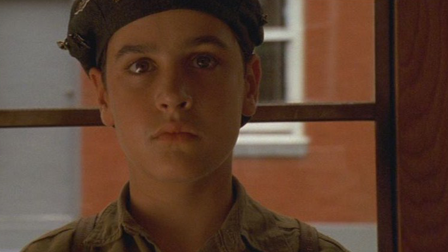
7: King of the Hill
One of Steven Soderbergh’s most criminally underseen works, 1993’s King of the Hill remains the eclectic helmer’s most humane and emotional piece of cinema. Featuring a cast of then-unknowns including Adrien Brody, Katherine Heigl, Lauryn Hill (yes, that Lauryn Hill), Buffy’s Amber Benson, and in the lead role, Swimfan and Flags of Our Fathers star Jesse Bradford, the film is not currently available on home video in the US but is well worth seeking out at the neighborhood archival video store (which is where this writer located a VHS copy). Bradford plays Aaron, an imaginative young man struggling to survive in Depression-era St. Louis. His father, a traveling salesman (played by Bond villain and Verhoeven veteran Jeroen Krabbe), is distant and cold. His mother is in and out of the local sanitarium to the point that Aaron’s younger brother is sent away for the summer to stay with relatives. The film covers Aaron’s adventures and travails during a summer of loneliness and discovery, taking him from the classroom to the streets and back to his dingy hotel surroundings with a lightness of touch long since absent from Soderbergh’s recent output. Elliot Davis’ warm filmic tones outshine the ghostly sterility of “Peter Andrews,” while the score by longtime Soderbergh collaborator Cliff Martinez brings a whimsical air to the proceedings and never lets the light in Aaron’s hopeful eyes turn to cynical darkness. Lovely supporting turns by Karen Allen and the aforementioned Benson aid Bradford’s wonderfully grounded turn. Fans of Empire of the Sun and A Tree Grows In Brooklyn are encouraged to seek out this forgotten gem, which greatly deserves a rerelease on Region 1 home video. King of the Hill never shies away from depicting the harshness of daily Depression-era living yet remains hopeful about the future of its bright young protagonist, and twenty years after its release, holds up quite well as a result.
– Gabe Bucsko
(Picks: King of the Hill, Out of Sight, Sex, Lies, and Videotape, Solaris, Ocean’s Eleven)

8: (Tie) Che: Part 2
Far more sombre than the first installement, Che Pt. 2 depicts the last days of Che Guevera as he leads a failed revolution in Bolivia. Che Guevera has changed since we last saw him, and after several failed attempts at kindling revolutions similar to the one in Cuba, he finds himself on his last campaign. The film portrays a far more desperate Guevera who seems to have lost all passion for the people and now strives uniformly on the high of revolution. That is not to say he loses all soul, but seems beaten down by life, sick with lost dreams and failed ambitions. Set primarily in the jungle, the film is tinted with a sickly green. We feel the weight of the humidity, as the thick air obscures the hidden secrets and strategies of the enemy. Del Toro shines in this reprisal, and portrays a far more contentious period in Guevera’s life with incredible intensity, obsession and ultimately stoicism. Che Pt. 2 is a troubling film that puts into question intention versus practise, pressing enormous doubt on our pursuit for freedom.
– Justine Smith
(Picks: The Limey, Contagion, Out of Sight, The Girlfriend Experience, Che: Part 2)
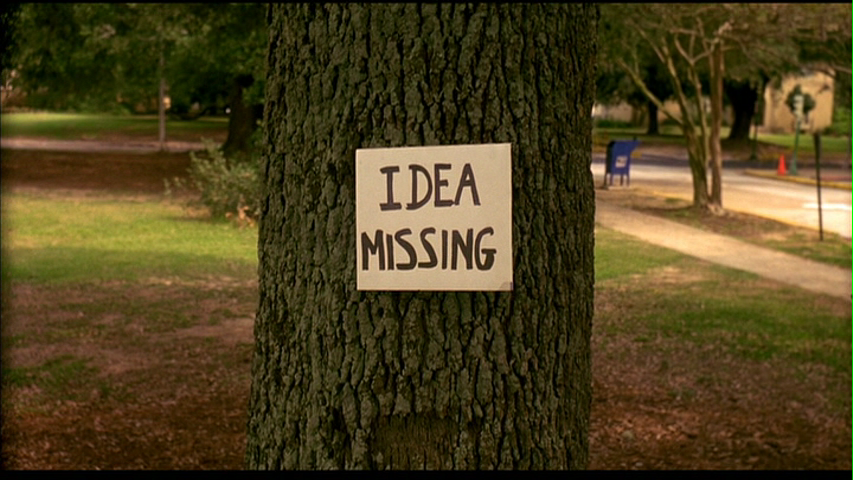
8: (Tie:) Schizopolis
Even in a filmography as diverse as Soderbergh’s, Schizopolis stands out as an odd duck. A sly suburban satire, a supremely postmodern comedy, as well as an unlikely starring vehicle for the director himself, it’s more formally playful than anything he’s done since. What’s more, though it’s frequently just this side of wacky (particularly in its use of language), it actually functions much more readily as contemporary social commentary than his much-ballyhooed debut, Sex, Lies, and Videotape, which is difficult to even make it through so many years removed from its heyday. Schizopolis is by far the more entertaining and incisive watch, and given his considerable screen presence here, it’s surprising Soderbergh didn’t spend any more time in front of the camera.
– Simon Howell
(Picks: The Limey, Schizopolis, Out of Sight, Contagion, The Informant)
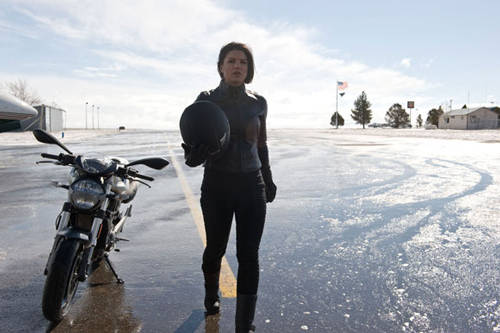
8: (Tie) Haywire
If Matt Damon had been Bourne with a vagina then he’d be the star of Haywire, Steven Soderbergh’s recent recruit to the Hollywood action movie genre. Always the great experimentalist who has assaulted any number of generic arenas with his rejuvenating approach to the form, again Soderbergh seemed exasperated with the conventions of the modern action movie and decided to throw his beret into the disoriented ring with this enormously entertaining and exciting movie, what it may lack in depth or substance is camouflaged with an unadorned visual purity and epinephrine pulsing gait that left me breathless and exhausted as the credits began to roll. In a similar stroke (if you’ll excuse the expression) of casting real life porn star Sasha Gray as the high-class call-girl of the unfairly maligned The Girlfriend Experience, in Haywire Soderbergh pulls an identical trick (if you’ll excuse the expression) by casting real life mixed martial art champion Gina Carano in the central role, a casting coup d’état which exposes a central heroine without any baggage or preconceived notions, an insurgent brimming with deadly improvisation in a hazy world of chilled and precise combat. With an opening sortie at a snowy Colorado diner and rarely depressing the brakes as a starry crop of supporting players are exposed its an adrenaline fuelled affair, from Michael Douglas as a senior Intelligence commissioner, from Bill Paxton as Mallory’s encrypted father and Antonio Banderas as a suspiciously bearded foreign mediator, they all battle with Mallory at their peril as I believe she has recently been included in the Oxford Encyclopedia Dictionary definition of ‘broads with whom one does not fuck with’;
– John McEntee
(Picks: Out of Sight, Ocean’s Eleven, Solaris, Haywire, Kakfa)

